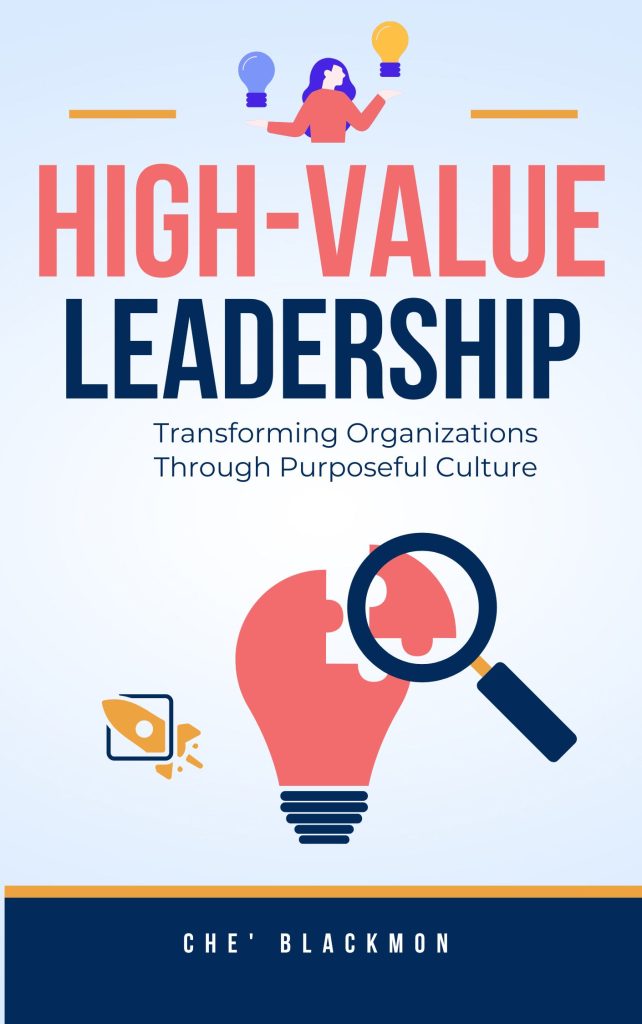In today’s complex organizational environments, culture cannot be managed solely from the executive suite or HR department. As I explain in “Mastering a High-Value Company Culture,” meaningful cultural transformation requires distributed leadership—individuals throughout the organization who understand, embody, and actively advance the desired culture. These culture champions serve as the vital connective tissue that brings values and purpose to life across different functional areas, hierarchical levels, and geographic locations.
The concept of culture champions isn’t new, but its strategic importance has grown significantly as organizations become more distributed, virtual, and complex. In “High-Value Leadership: Transforming Organizations Through Purposeful Culture,” I emphasize that high-value cultures are built through consistent, aligned behaviors across the entire organization—not just through leadership declarations or policy statements.
This distributed approach to cultural leadership aligns with research showing that employees are 57% more likely to embrace cultural values when they see them modeled by peers rather than just hearing about them from executives. Let’s explore how to identify, develop, and leverage culture champions to create meaningful cultural alignment across your organization.
Why Culture Champions Matter
Before diving into implementation, it’s important to understand the unique value that culture champions bring:
Cultural Translation: They adapt organization-wide values to specific departmental contexts, making them relevant and actionable for their colleagues.
Authentic Modeling: As peers rather than authority figures, they demonstrate that cultural behaviors are realistic and achievable.
Early Warning Systems: They provide valuable feedback about cultural disconnects or implementation challenges before they become widespread issues.
Change Acceleration: Research from McKinsey suggests that change initiatives with robust change agent networks are 3.5 times more likely to succeed than those without such networks.
Cultural Sustainability: They maintain cultural consistency during leadership transitions and organizational changes.
The most effective culture champions aren’t necessarily the most vocal or charismatic team members. Instead, they possess a unique combination of cultural alignment, credibility with peers, and the courage to speak up when values are either honored or compromised.
The Detroit Lions Model: Champions at Every Level
The transformation of the Detroit Lions under Dan Campbell’s leadership, which I discuss in “High-Value Leadership,” provides a compelling example of effective culture champions in action. While Campbell set the overall cultural direction, the team’s remarkable turnaround was fueled by champions at every level of the organization.
Campbell intentionally identified and developed what he called “standard bearers”—players and staff who exemplified the team’s cultural values of grit, resilience, and teamwork. These individuals weren’t just star performers; they were selected for their influence with peers and their commitment to the team’s cultural vision.
What made the Lions’ approach particularly effective was the distribution of these champions across different position groups, experience levels, and functional areas. Veterans modeled the culture for rookies, while support staff reinforced the same values in their interactions with players. This multi-level approach created consistent cultural messaging from all directions.
One player noted: “In previous teams, there was often a disconnect between what coaches said about culture and what actually happened in the locker room. Here, our culture is reinforced by the guys next to you. When your teammates hold the standard, it’s much more powerful than when it just comes from the top.”

Identifying Potential Culture Champions
Developing an effective culture champion network begins with identifying the right people. Here are key criteria to consider:
1. Credibility with Peers
Culture champions must have the respect and trust of their colleagues to be effective. This credibility might come from expertise, tenure, relationship skills, or demonstrated character.
Identification Strategy:
- Conduct social network analysis to identify informal influencers
- Observe who colleagues naturally turn to for guidance or support
- Look for individuals who mentor others without formal responsibility
- Gather peer nomination data through anonymous surveys
2. Values Alignment
Effective champions must genuinely embrace the organization’s values and purpose, demonstrating them consistently in their work and interactions.
Identification Strategy:
- Observe how potential champions respond to challenging situations
- Look for natural alignment between their personal values and organizational values
- Assess consistency between their words and actions
- Notice who speaks up to defend or promote cultural values in discussions
Expert Insight: According to culture researcher Edgar Schein, the most effective culture carriers are those who have experienced personal success through behaviors aligned with the desired culture. Their advocacy comes from authentic belief rather than compliance.
3. Communication Capability
While champions don’t need to be extroverts, they do need the ability to articulate cultural values and translate them into concrete behaviors.
Identification Strategy:
- Look for individuals who can explain “why” behind processes and decisions
- Observe who effectively translates complex concepts into simple language
- Notice who asks clarifying questions in discussions about values and expectations
- Identify those who can adapt their communication style to different audiences
4. Courageous Voice
Champions must be willing to speak up—both to celebrate when values are honored and to address situations when they’re compromised.
Identification Strategy:
- Notice who respectfully addresses behaviors that don’t align with values
- Identify those who take stands on issues of principle, even when uncomfortable
- Look for individuals who raise important issues others avoid
- Observe who provides constructive feedback to colleagues at all levels
Case Study: Healthcare System Champions
A healthcare system I worked with was struggling to create consistent patient experience across multiple facilities with different historical cultures. Their champion identification process included an innovative “values in action” approach where staff members could recognize colleagues who exemplified specific cultural values.
Analysis of a year’s nominations revealed unexpected champions, including environmental services staff, schedulers, and technical specialists who weren’t in formal leadership roles but had tremendous cultural influence. These individuals became the core of a cross-functional champion network that drove significant improvements in patient experience scores.
One particularly effective champion was a radiology technician who had been with the organization for over 20 years. Without formal authority, she had become the cultural compass for her department, consistently demonstrating and reinforcing patient-centered behaviors. When asked how she approached this role, she explained: “I just believe that we’re here to make a difference in patients’ lives. When I see someone living with that value, I make sure they know it matters. And when I see someone forgetting it, I remind them why we’re here.”
Developing Effective Culture Champions
Identifying potential champions is just the first step. To maximize their impact, organizations must intentionally develop their capabilities and create systems for their success.
1. Knowledge and Understanding
Ensure champions have deep knowledge of the organization’s culture—not just the stated values, but the underlying rationale and desired behaviors.
Development Strategy:
- Provide immersive learning experiences about the organization’s purpose and values
- Create opportunities for dialogue with senior leaders about cultural priorities
- Develop simple, memorable ways to articulate cultural principles
- Share case studies that bring cultural values to life
2. Champion-Specific Skills
Equip champions with the unique skills they need to influence culture effectively.
Development Strategy:
- Train in peer coaching techniques
- Develop facilitation skills for values-based discussions
- Build capability in providing behavioral feedback
- Enhance storytelling abilities to share culture-reinforcing narratives
3. Community Building
Create connections between champions to strengthen their collective impact and provide mutual support.
Development Strategy:
- Establish regular champion forums for sharing experiences and strategies
- Create digital spaces for ongoing collaboration
- Pair experienced champions with newer ones for mentoring
- Facilitate cross-functional learning between champions
Current Trend: Leading organizations are implementing digital platforms specifically designed for culture champion communities. These platforms enable champions to share success stories, troubleshoot challenges, and access resources that support their role.
4. Recognition and Support
Acknowledge the important contribution champions make and provide the support they need to be effective.
Development Strategy:
- Recognize champion contributions through formal and informal channels
- Allocate specific time for champion activities
- Provide resources for team culture-building initiatives
- Create access to leadership for guidance and escalation when needed
Case Study: Technology Company Champion Development
A technology company struggling with cultural fragmentation across engineering, product, and sales teams implemented a comprehensive champion development program called “Cultural Catalysts.”
The program included:
Cultural Immersion: Champions participated in a two-day intensive that deepened their understanding of the company’s history, purpose, and values through storytelling, discussion, and experiential activities.
Skill Building: Monthly development sessions built specific capabilities such as facilitating values-based discussions, providing behavioral feedback, and leading change within peer groups.
Leadership Connection: Quarterly roundtables with senior leaders allowed champions to surface cultural challenges and collaborate on solutions.
Resource Allocation: Champions received a dedicated budget for team culture-building initiatives and were allocated 10% of their work time for champion activities.
Within a year of implementation, employee survey data showed significant improvements in cultural alignment across previously fragmented departments. Cross-functional collaboration increased by 37%, and retention of high performers improved by 23%.
Activating Culture Champions Effectively
Once identified and developed, champions need clear direction and support to maximize their impact.
1. Focused Culture Initiatives
Give champions specific, time-bound initiatives to lead rather than general cultural responsibility.
Implementation Strategy:
- Creating 60 or 90-day “culture sprints” focused on specific aspects of culture
- Provide clear objectives and success measures for each initiative
- Develop implementation toolkits with ready-to-use resources
- Establish regular checkpoints to assess progress and provide support
2. Integration with Existing Processes
Rather than creating separate “culture work,” help champions integrate cultural elements into existing business processes.
Implementation Strategy:
- Identify key business processes that could better reflect cultural values
- Train champions to facilitate values-based discussions within operational meetings
- Develop cultural lenses for reviewing significant decisions or plans
- Create simple ways to incorporate cultural elements into daily work
Expert Insight: According to research by the Barrett Values Centre, culture initiatives are 4.5 times more likely to succeed when they are integrated into existing processes rather than implemented as separate programs.
3. Multi-Channel Influence
Equip champions to influence culture through multiple channels appropriate to their context.
Implementation Strategy:
- Develop a menu of influence options ranging from one-on-one conversations to team activities
- Creating shareable content champions can customize for their teams
- Provide discussion guides for specific cultural topics
- Establish regular forums for culture-focused conversations
4. Feedback Loops
Create mechanisms for champions to share insights and challenges with leadership.
Implementation Strategy:
- Establish regular champion advisory sessions with senior leaders
- Implement “cultural pulse” reporting from champions
- Create escalation pathways for systemic cultural issues
- Develop metrics for tracking champion impact and cultural progress
Current Trend: Leading organizations are implementing “culture champion councils” that meet quarterly with executive leadership to share frontline cultural insights and collaborate on solutions to emerging challenges.
Implementation Framework
Implementing an effective culture champion network requires a phased approach:
Phase 1: Foundation (4-6 weeks)
- Define champion roles and responsibilities
- Establish selection criteria
- Create an initial identification process
- Develop leadership alignment around champion approach
Phase 2: Identification and Recruitment (4-8 weeks)
- Identify potential champions using multiple data sources
- Conduct selection conversations
- Create initial champion cohort
- Establish baseline measurements for cultural metrics
Phase 3: Development and Activation (8-12 weeks)
- Implement champion orientation and training
- Create champion community structure
- Launch initial culture initiatives
- Establish support and guidance mechanisms
Phase 4: Sustainability (Ongoing)
- Implement regular champion development
- Create processes for adding new champions
- Establish recognition for champion contributions
- Develop metrics for measuring champion impact
Questions for Reflection
As you consider implementing culture champions in your organization, reflect on these questions:
- Who are the informal cultural influencers in your organization, and how effectively are you leveraging their impact?
- How might you identify potential champions who represent diverse perspectives and departments but share commitment to your desired culture?
- What specific skills would champion in your organization need to effectively translate your values into their functional contexts?
- How could you integrate champion activities into existing business processes rather than creating separate “culture work”?
- What support mechanisms would your champions need to be effective while balancing their primary job responsibilities?
- How would you measure the impact of culture champions on your broader cultural transformation goals?
Partner with Che’ Blackmon Consulting
Developing an effective culture champion network requires expertise, intentionality, and a comprehensive approach. At Che’ Blackmon Consulting, we specialize in helping organizations identify, develop, and leverage culture champions to create high-value cultures across diverse functions and locations.
Our Culture Champion Development program provides:
- Comprehensive assessment of current cultural influence networks
- Custom-designed champion selection and development approaches
- Implementation support for champion activation
- Ongoing guidance and measurement systems
Each engagement is tailored to your organization’s unique challenges and aspirations, guided by the principles of authenticity, inclusion, excellence, innovation, and empowerment that form the foundation of our practice.
To learn how we can help your organization build a powerful network of culture champions, contact us at admin@cheblackmon.com or 888.369.7243.
Building culture champions across departments isn’t merely a nice-to-have cultural initiative—it’s a strategic approach to creating organizational alignment and accelerating transformation. By identifying individuals who naturally influence their peers, equipping them with the skills and resources they need, and activating them around specific cultural priorities, you can create a powerful network that brings your desired culture to life throughout the organization.
#CompanyCulture #CultureChampions #OrganizationalDevelopment #ChangeManagement #LeadershipDevelopment #EmployeeEngagement #CrossFunctionalCollaboration #CulturalTransformation


